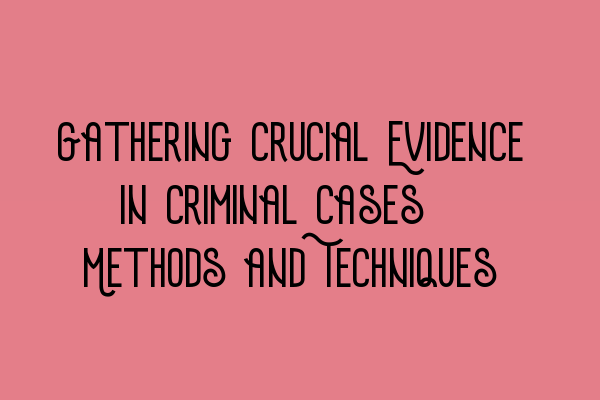Gathering Crucial Evidence in Criminal Cases: Methods and Techniques
When it comes to criminal law cases, the quality and quantity of evidence gathered can make or break a case. As a solicitor practicing criminal law, it is essential to understand the various methods and techniques available for gathering crucial evidence. In this blog post, we will explore effective strategies that can help you secure the evidence needed to build a strong criminal case.
1. Witness Statements:
One of the most common methods of gathering evidence is through witness statements. Witnesses can provide firsthand accounts of events, helping to establish the timeline and provide valuable insights into the crime. To gather witness statements effectively, it is crucial to conduct thorough interviews, ask open-ended questions, and ensure the statements are signed and dated. Witness statements can serve as compelling evidence during court proceedings.
Keywords: witness statements, firsthand accounts, interviews, timeline, court proceedings.
2. Surveillance and CCTV Footage:
With the increasing prevalence of surveillance cameras in public places, CCTV footage has become a valuable source of evidence in criminal cases. Reviewing footage from cameras near the crime scene can provide crucial information about the identity of the suspect, their movements, and any potential witnesses. It is important to act quickly to secure the footage before it is overwritten or destroyed. Additionally, private investigators can also be hired to conduct surveillance and gather evidence discreetly.
Keywords: surveillance, CCTV footage, crime scene, suspect identity, private investigators.
3. Forensic Evidence:
Forensic evidence plays a vital role in modern criminal investigations. Techniques such as DNA analysis, fingerprinting, ballistics, and toxicology provide objective and scientific evidence that can link suspects to a crime scene or corroborate witness statements. It is essential to work closely with forensic experts and ensure proper chain of custody is maintained to prevent contamination of evidence. As a solicitor, understanding the significance of forensic evidence and presenting it effectively in court can greatly strengthen your case.
Keywords: forensic evidence, DNA analysis, fingerprinting, ballistics, toxicology, chain of custody.
4. Digital Evidence:
In today’s digital age, electronic devices and online communications have become an integral part of criminal investigations. Gathering digital evidence, such as emails, text messages, social media posts, and computer records, can provide valuable insights into a suspect’s activities, associations, and intentions. To collect digital evidence, it is crucial to work with computer forensics specialists who can extract data and ensure its admissibility in court. Understanding the technical aspects of digital evidence and its legal implications is essential for successfully presenting this evidence.
Keywords: digital evidence, emails, text messages, social media, computer records, computer forensics.
5. Expert Witnesses:
In complex criminal cases, expert witnesses can play a crucial role in providing specialized knowledge and opinions that can help interpret evidence and guide the court’s understanding. Expert witnesses may include forensic scientists, psychologists, medical professionals, or other specialists relevant to the case. It is important to carefully select and prepare expert witnesses to ensure their credibility and effectiveness in court.
Keywords: expert witnesses, specialized knowledge, forensic scientists, psychologists, medical professionals.
6. Documentary Evidence:
Documents such as contracts, financial records, photographs, and medical reports can often provide compelling evidence in criminal cases. Gathering and presenting these documents effectively can help establish motives, corroborate witness statements, or prove the defendant’s involvement in the crime. It is important to ensure the authenticity of these documents and follow proper procedures for introducing documentary evidence in court.
Keywords: documentary evidence, contracts, financial records, photographs, medical reports, authenticity.
In conclusion, gathering crucial evidence is an essential aspect of criminal law practice. By employing various methods and techniques such as witness statements, surveillance footage, forensic evidence, digital evidence, expert witnesses, and documentary evidence, solicitors can build a robust case that stands up to scrutiny in court. Remember, the thoroughness, relevance, and admissibility of the evidence can make a significant difference in securing a favorable outcome for your clients.
If you need assistance with criminal law cases or require a skilled solicitor to help gather crucial evidence, contact SQE Criminal Law & Practice Law UK today. Our team of experienced professionals is dedicated to providing the highest level of legal support and expertise.
